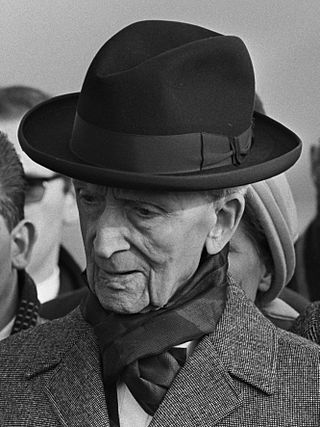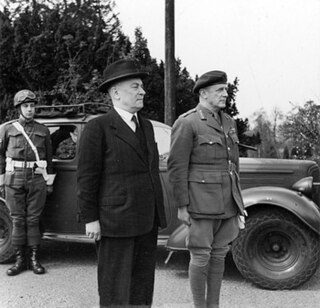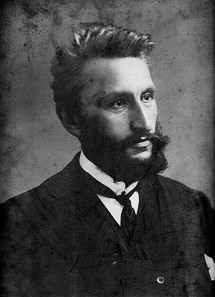
Henri (Hendrik) de Man was a Belgian politician and leader of the Belgian Labour Party (POB-BWP). He was one of the leading socialist theoreticians of his period and, during the German occupation of Belgium during World War II, played a limited role in collaboration.
Neosocialism was a political faction that existed in France and Belgium during the 1930s and which included several revisionist tendencies in the French Section of the Workers' International (SFIO).

Emile Vandervelde was a Belgian socialist politician. Nicknamed "the boss", Vandervelde was a leading figure in the Belgian Labour Party (POB–BWP) and in international socialism.

Jean Joseph Camille Huysmans was a Belgian politician who served as the prime minister of Belgium from 1946 to 1947.
The Communist Party of Belgium was a political party in Belgium from 1921 to 1989. The youth wing of KPB/PCB was known as the Communist Youth of Belgium. The party published a newspaper known as Le Drapeau Rouge in French and De Roode Vaan in Dutch.

Achille Van Acker was a Belgian politician who served three terms as the prime minister of Belgium between 1946 and 1958. A moderate from Flanders, Van Acker was a member of the Belgian Socialist Party (PSB–BSP) and played an important role in the creation of the Belgian welfare state after World War II.
The International Socialist Bureau was the permanent organization of the Second International, established at the Paris congress of 1900. Before this there was no organizational infrastructure to the "Second International" beyond a series of periodical congresses, which weren't even given a uniform name. The host party of the next congress was charged with organizing it.
The Progressive Party of Belgium was a progressive liberal party which existed from 1887 until 1900.

The Maison du Peuple (French) or Volkshuis (Dutch), both literally the "House of the People", was a public building located on the Place Emile Vandervelde/Emile Vanderveldeplein, in the Sablon/Zavel district of Brussels, Belgium. It was one of the most influential Art Nouveau buildings in Belgium and one of the most notable designs by the architect Victor Horta. Commissioned by the Belgian Workers' Party (POB/BWP), it was constructed between 1896 and 1899, and opened on 2 April 1899.

The Charter of Quaregnon is a political manifesto agreed to in 1894 that formed the doctrinal basis for successive socialist parties in Belgium until 1979.

The Belgian Government in London, also known as the Pierlot IV Government, was the government in exile of Belgium between October 1940 and September 1944 during World War II. The government was tripartite, involving ministers from the Catholic, Liberal and Labour Parties. After the invasion of Belgium by Nazi Germany in May 1940, the Belgian government, under Prime Minister Hubert Pierlot, fled first to Bordeaux in France and then to London, where it established itself as the only legitimate representation of Belgium to the Allies.

The general strike of 1893 was a major general strike in Belgium in April 1893 called by the Belgian Labour Party (POB–BWP) to pressure the government of Auguste Beernaert to introduce universal male suffrage in elections. The general strike was the first called in Belgium and a decisive moment for the nascent socialist movement in Belgium. According to the historian Carl J. Strikwerda, it was the first true general strike in the history of Europe.

Since 1893, there have been a number of general strikes in Belgium. Occasioned by the emergence of the labour movement and socialism in Belgium, general strikes have been an enduring part of Belgian political life. Originally intended to encourage the reform of the franchise, more recent strikes have focused on issues of wages and opposition to government austerity. Since 1945, general strikes have been co-ordinated by the General Federation of Belgian Labour (ABVV-FGTB), a federation of Socialist trade unions, while most before World War II were organised by the parliamentary Belgian Labour Party (POB-BWP).

Célestin Demblon was a Belgian socialist politician, teacher and writer, known for his anti-clerical views and his promotion of Francophone Walloon culture. He was also a creative writer in the Symbolist tradition and the author of books on a variety of topics, most notably the Shakespeare authorship question.

The Labour Plan, commonly known as the Plan De Man after its creator, was an economic policy devised in 1933 by the Belgian politician Henri De Man of the Belgian Labour Party (POB-BWP), to combat the economic situation experienced by Belgium in the aftermath of the Great Depression. The plan, described as a "Labour Plan", was one of the foremost examples of De Man's doctrine of "Planisme". The policy was aimed at "instilling a mixed economic system" by the creation of "a nationalized sector covering the organization of credit and the main industries which have already in reality been monopolized."

The general strike of 1902 was a major general strike in Belgium, aimed at forcing electoral reform and notably the end of the system of plural voting. It officially lasted between 10 and 20 April. The 1902 strike was the second general strike in Belgium's history and although the largest, it was ultimately unsuccessful at achieving its objectives.
The general strike of 1913 was a major general strike in Belgium. It was the third general strike aimed at forcing electoral reform and, like the general strike of 1902, was particularly aimed at ending the system of plural voting. It officially lasted between 14 and 24 April and brought out between 300,000 and 450,000 workers on strike. Despite its large participation, it was relatively peaceful.
Events in the year 1899 in Belgium.

Louis de Brouckère was a Belgian socialist journalist, politician and academic. He was a member of the Belgian Labour Party from the 1890s.

Jeanne Augusta Félicienne Beeckman was a Belgian medical doctor, socialist, feminist, and anti-fascist.













